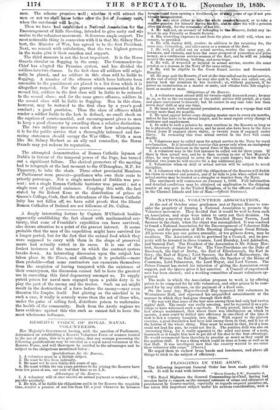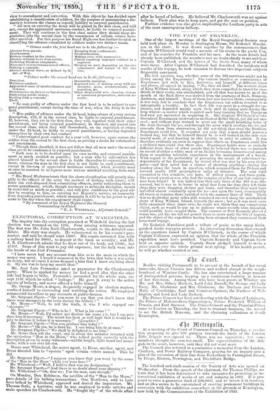FLOGGING IN THE ARMY.
The following important General Order has been made public this week. It will be read with interest
"Horse Guards, S.W., November 9. "His Royal Highness the General Commanding-in-Chief, having had occasion lately to remark on the unequal estimate of crime and allotment of punishment by Courts-martial, especially as regards corporal punishment, has taken this important subject under his anxious consideration, with a
view to amendment and correction. With this object be has decided upon establishing a elaesification of soldiers, for the purpose of maintaining a dis- tinction between the classes as regards liability to corporal punishment. "AU men on entering the Army will be placed in the first class, and will sot, except for aggravated mutinous conduct, be liable to corporal punish- ment. They will continue in the first class unless they should incur de- gradation into the second class by the commission of certain crimes here- after specified. For this purpose his Royal Highness has further decided on classifying the offences committed by soldiers under two distinct heads.
"Crimes under the first head are to be the following :- Absence from parade. Drunkenness.
Riotous conduct in the streets.
Absence without leave from tattoo. Preferring frivolous complaints. Disrespect to non-commissioned officers. Striking a comrade. Absence without leave, as defined by 51 Art. of War.
"Crimes under the second head are to be the following . Desertion.
Mutinous conduct.
Aggravated cases of insubordination and violence.
Drunkenness on duty or on line of march. Embezzling public money. Stealing from a comrade. Theft.
"No man guilty of offences under the first head is to be subject to cor- poral punishment, except during the time of war, when the Army is in the field.
"Men guilty of offences under the 2d head, being crimes of every serious description, will, if in the second class, be liable to corporal punishment. If, however' they are in the first class, they will, together with their other punishment, not being corporal punishment, be disrated, and passed into the second class, when they will thenceforth, on the repetition of crimes under the 2d head, be liable to corporal punishment, as having degraded themselves by their own bad conduct.
"Uninterrupted good conduct for a year will, however, again restore the soldier from the second to the first class, as proving a desire for reformation and amendment.
"Though thus classified, it does not follow that all men under the second class are to be condemned to corporal punishment.
"Each case is to be decided upon its own merits, and corporal punish- ment as much avoided as possible; but a man who by misconduct has i placed himself in the second class s liable thereafter to corporal punish- ment, whereas the man in the first class is not liable to such punishment, except in the case of aggravated mutinous conduct, when severity must at once be resorted to to repress more serious mischief resulting from such conduct.
"His Royal Highness trusts that the above classification will greatly trim- plify to the officers of the army the method of dealing with crime ; will deter the evil-disposed from committing offences, justly subjecting them to severe punishment, which, though necessary to maintain discipline, should be restricted as much as possible ; and will give confidence to the good sol- dier by securing to him, on entering her Majesty's service, an immunity from degrading punishment, which immunity it will be in his power to pre- serve to the day when his engagement shall expire. "By command of his Royal Highness the General Commanding-in-Chief, Escaping from confinement. Insubordination.
Making away with necessaries.
Falsely imputing improper conduct to a superior.
Sleeping on post, depending on the cir- cumstances and nature of the ser- vice.
Designedly maiming. Repeated acts of making away with ne- cessaries, arms, accoutrements, am- munition, &c. Other disgraceful acts showing vicious or unnatural propensities, indecent as- saults.
"G. A. WETHEML, Adjutant-General"



























 Previous page
Previous page